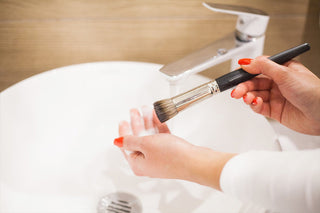You already know how to use your eyeshadow brush to coat your lid, how to use your sponge to contour your cheeks perfectly, and how to line your lips with a lip brush, but did you know those tools need to be cleaned? If you want your makeup to apply effectively and smoothly, you need to wash those brushes.
Washing your makeup brushes might not sound like the most glamorous thing, but if you want to keep your skin clean and cute, pay attention.
Read on to find out how often to wash your brushes, tips for how to wash effectively, and learn when your brushes need to be replaced.
Why Do Makeup Brushes Need To Be Washed?
Think of how many times a week you use your makeup brushes. You might use them up to once or twice a day. Each time more product gets caked into the brushes and is left over for the next time. Product buildup is not fun.
Any product left on your brushes can interfere with whatever technique you’re working on the next time. This is especially bad when you’re using a dark color lipstick or eyeshadow. If you perfect your smokey eye look and then try to use that brush to put on a light base color eyeshadow the following day, you might not see the results you want.
If that’s not enough to scare you into washing your brushes, any product left on your brushes can grow bacteria. That’s pretty icky, but it’s even worse! That bacteria can then cause breakouts and acne on your face. Imagine using your brushes to cover existing blemishes while accidentally causing more with dirty makeup brushes.
Washing your brushes will remove any leftover product, which will allow you to use your brushes effectively and correctly. Using clean makeup brushes will also help prevent any bacteria buildup and not lead to more breakouts and skin irritation. If washing our brushes helps us nail our look and keep our skin healthy, count us in.
In addition to making makeup application easier and keeping your skin healthy, keeping your makeup brushes clean can help you extend the life of your brushes. Any gunk, bacteria, or oil left on brushes can wear the brushes down after a while, and they won’t last as long. If you are going to invest in quality makeup tools, take care of those products so they’ll last a long time.
How Often Do Makeup Brushes Need To Be Washed?
By now, you’re on board with washing your brushes, but maybe you need a little guidance about how often that needs to happen. Makeup artists and dermatologists say ideally, you should wash your brushes after each use.
At a bare minimum, try to wash your makeup brushes once a week. Certain brushes might need to be washed a little bit more or less, but getting in a routine of washing everything once a week is a great strategy. Blast some fun music, have a dance party while washing, and you’ll have this built into your routine in no time.
Any brushes or sponges used with a liquid or cream will need to be washed more often. Your favorite foundation sponge or cream eyeshadow brush needs a little TLC. Try to wash these a couple of times a week at least. Powder brushes and brushes that stay dry don’t need to be washed as often or as deeply, so once a week will be fine for those.
Tip # 1: The Best Way To Wash Your Brushes
OK, Kuties, we’ve committed to cute, clean skin, and we’re going to wash our brushes once a week. Now we need to figure out how to do that.
Before you toss your brushes in the washing machine or dishwasher (bad idea), check out some tips below.
How Do You Clean Powder Brushes?
If you use powder eyeshadow, you’ve probably already noticed all the excess powder that comes off the brush. The first step in washing powder brushes is to gently remove that powder.
Softly tap your brush or sponge over a paper towel to shake off the excess. You can also carefully rub the tip along the towel to remove some of the powder.
Be careful not to rub too hard as this could damage the ends of your brush. Use this for a more frequent and quick cleaning.
For a deeper cleaning once or twice a week, follow the cream brush instructions below:
How Do You Clean Cream Brushes?
We all love cream or jelly eyeshadow, but it can tend to get caught up in makeup brushes. The skin around your eyes is so delicate, so we want to be sure to wash these brushes gently but also effectively.
One of the best brush cleaning solutions is something you probably already have around your house: dishwashing soap.
Fill a glass with warm water (never use hot water) and a tiny bit of dish soap, and swirl your brush through the soapy mixture. If there is extra buildup, massage the bristles gently against the glass to remove any residue. You can also use your fingers to massage the brushes, but make sure your hands are clean.
Once done, be sure to rinse all the soap off your brush. Using your fingers, squeeze any excess water off the brush and then lay it flat on the counter to dry. Be sure to let the brush dry completely before using it again. It might take a few hours, so check on it periodically before putting it away.
In just a few minutes, and with no expensive items, you’ve cleaned your makeup brushes. How easy is that?
If you get in the habit of cleaning your brushes once a week, you can clean a couple at a time, and the process will go by even faster. Can’t wait to see the looks you’ll create with your clean brushes, Kutie!
What Cleaning Products Should We Avoid?
Make sure to always clean your brushes with gentle soap, especially if you have brushes made of natural hair, as they can be damaged much more quickly. Other household products that work as a makeup brush cleaner include baby shampoo. Avoid ingredients like olive oil and vinegar.
Be careful when using products high in alcohol content. While this product is great at killing germs, it can sometimes dissolve the glue that keeps your brush in one piece.
Tip # 2: How To Clean Makeup Sponges
Because of their design, makeup sponges can be a little trickier to clean. Also, because of their design, your makeup sponge is probably full of your favorite highlighter, blush, or bronzer. We definitely need to make sure these sponges are as clean as possible.
If you clean your sponge regularly and don’t need a deep clean, you can follow similar instructions to your brushes. Make sure your hands are clean and start by wetting your sponge.
Using dish soap, place a small dollop directly on the sponge and rub it gently against the palm of your hand, working it into a lather. Repeat this process until no makeup is visible on the sponge.
Your sponge might be looking a little worse for wear. If you can’t see the original color of the sponge because of all the makeup covering it, it’s time for a deep cleaning. In a small bowl or mix, create a mixture of lukewarm water and dish soap. Place your sponge in the mixture and let it soak for a few minutes.
Once it’s done soaking, give the sponge a good squeeze. If the sink water runs the same color as your foundation, you definitely made the right choice in taking a moment for a deep clean.
One important thing to keep in mind when washing your sponges is to make sure they are completely dry and free of excess moisture. Place them on a clean towel or mat and let them dry, rotating them to make sure each side dries. Once your sponge is completely dry, it’s ready to work.
Tip # 3: Replace Brushes When Needed
Cleaning your brushes often can help keep your brushes healthy and effective, but they can’t last forever. Like any other makeup product, brushes need to be replaced periodically to ensure they remain effective and get the job done.
There is no firm rule on when to replace brushes, as it depends on the material and quality of your brushes, as well as how often you use them. Generally speaking, make sure you replace your brushes every few years.
If you notice any bristles going in the wrong direction from the brush head, it might be time for a new brush. Also, if you notice that your makeup is suddenly applying patchy or missing spots, your makeup brush might be past its prime. Shedding bristles and dry bristles are also huge signs that you should be looking for a replacement.
Brush Hygiene: A Relaxing Soak
Your brush cleaning skills should now be as effective as your makeup applying skills. You’re a pro at them both!
Now you understand why it’s important to clean and maintain your brushes, as well as why brushes eventually have to be replaced. You know dirty brushes can ruin your makeup and cause breakouts.
Keep your brushes as clean as possible, and you’ll have healthy skin with perfectly applied makeup. Time to get glam!
Sources:
How To Clean Makeup Brushes | Good Housekeeping



